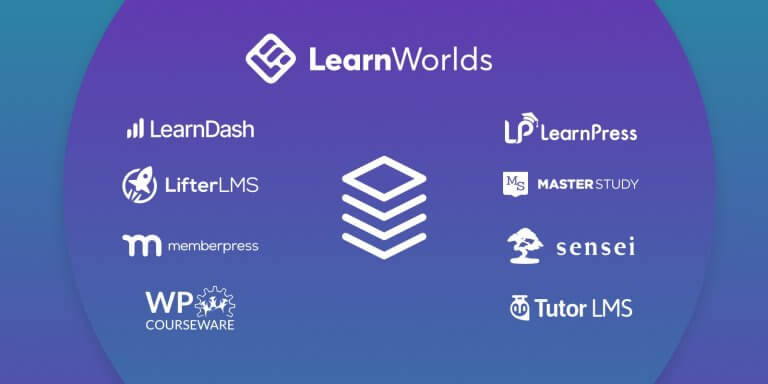
Table of Contents
Canvas LMS by Instructure is an open-source Learning Management System designed for K-12 and higher education institutions as well as companies of all sizes and industries.
While a robust platform, Canvas has several disadvantages, and definitely a lot of competition to keep up with. If you’re considering Canvas LMS to create online courses but want to explore more options too, you’re in the right place.
In this blog post, we review Canvas and its top competitors. We go over their main features and pricing plans and see how they compare to each other.
Canvas LMS overview
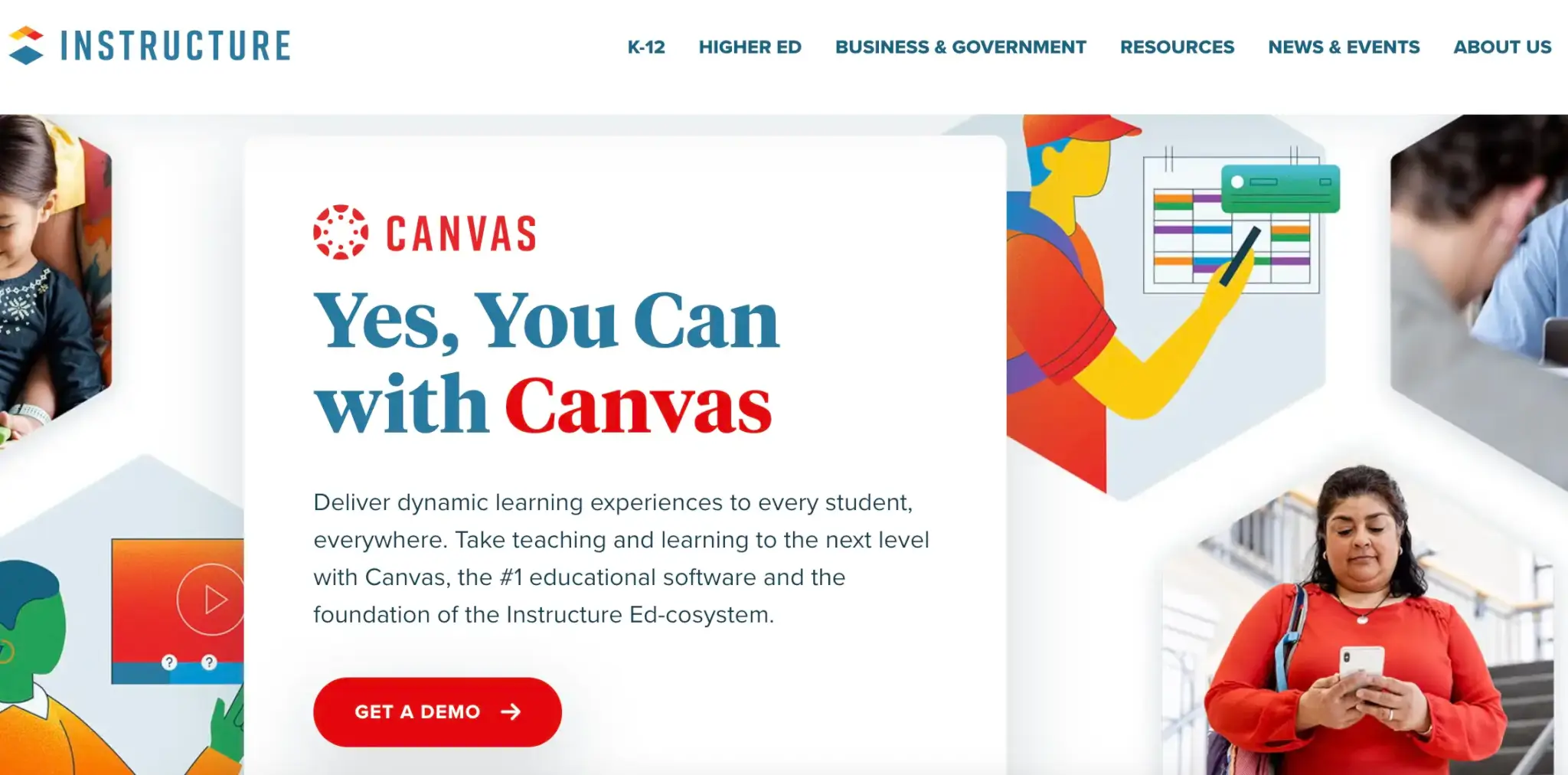





Canvas LMS supports different training delivery methods including self-paced, synchronous, or blended/hybrid learning. It integrates with video conferencing and collaboration tools, such as Zoom, Microsoft Teams, Google Classroom, and Adobe.
The platform boasts robust communication tools to engage learners, including instant messaging, group chatting, audio notes, and video capabilities. Additionally, it incorporates an advanced grading system and gradebook.
Using the pre-designed templates of Canvas Catalog, you can create a professional, branded marketplace to list and sell online courses categorized by department, organization, or team.
Other Canvas LMS features that stand out are its intuitive interface, accessibility features, certificate builder, easy self-registration, customized dashboards, real-time reports, and LTI (Learning Tools Interoperability) function. It also offers mobile apps for access on the go.
This all sounds good, so why look for Canvas LMS alternatives?
Where Canvas LMS falls short
Although Canvas LMS is indisputably a versatile LMS, it comes with several shortcomings that will make you think twice before investing in it.
❌ Third-party integrations are hard to set up
❌ No AI assistant
❌ Not fully SCORM compliant
❌ Confusing navigation for admins
❌ Inconsistent mobile app performance (glitches)
❌ Quizzes are hard to build & offer limited customization options
❌ Limited number of automations
❌ Limited customization in course settings
❌ Mixed reviews about customer support
The best Canvas LMS alternatives
If you’re looking for Canvas LMS alternatives that will not give you technical headaches and offer more flexibility in design, we have some more intuitive platforms to suggest. Let’s start with a quick table highlighting key features, use cases, and pricing info.
1. LearnWorlds






LearnWorlds is a flexible cloud-based platform that supports every aspect of an eLearning program, from course creation to training delivery and monitoring. From employee onboarding to compliance training, upskilling, and customer education, our platform seamlessly addresses diverse training needs. Even deskless employees can enjoy a smooth learning experience through our native mobile apps.
LearnWorlds is an AI-powered platform with an AI assistant featuring more than 200+ pre-built prompts. Our built-in authoring tool empowers you to craft engaging training modules with interactive content effortlessly. Enrich your course with videos, eBooks, PDFs, quizzes, self-assessments, certificates, and much more!
Moreover, tracking online training progress is made simple with real-time metrics, allowing you to monitor employee advancement at any given moment. Discover the various options LearnWorlds offers to oversee training progress and overall training status within your company.
Pros & Cons
Pros
- AI assistant with built-in prompts
- SCORM compliant
- Website builder with customizable templates
- Built-in authoring tool
- Fully white labeled
- Native mobile apps
- Advanced analytics
- Μultiple automations, bulk actions
- Custom user roles
- Tagging system for user segmentation
- Multiple schools
- Exams, self-assessments, surveys & certificates
- Built-in community
- eCommerce-ready
Cons
- Limited gamification
- Slight learning curve
Pricing
LearnWorlds offers a 30-day free trial and the following pricing plans:
For more information about feature availability per plan, visit our website.
💁See how LearnWorlds vs Canvas compare.
💁Learn how LearnWorlds can transform your training program. Read the success story of Workable, who went from hosting weekly webinars to onboard their customers to building a training academy with more than 350 daily users, at the same time achieving a noticeable drop in incoming support tickets.
2. Tovuti LMS






Tovuti LMS is one of the best Canvas LMS alternatives, better suited for corporate learning rather than educational institutions. It offers versatile course authoring tools for creating over 40 interactive, gamified content types. With features like whiteboards, screen sharing, and session recording, it ensures engaging online sessions. Learners also have access to personalized portals, transcripts, and social networking capabilities.
Tovuti LMS prioritizes security with regular updates and allows for customizable user groups and permissions. It offers detailed reports on learner behavior and course performance, while the Team Lead Dashboard enables reporting and communication through direct messaging. It also offers a content library with ready-made content and a mobile app.
Pros & Cons
Pros
- Intuitive, elegant UI
- Content library
- Built-in course authoring
- AI assistant
Cons
- A bit expensive
- Slow customer support
- Initial learning curve
- Needs more robust reporting
Pricing
Available upon request.
* Pricing information retrieved from Tovuti LMS on February 18, 2025.
3. Blackboard Learn
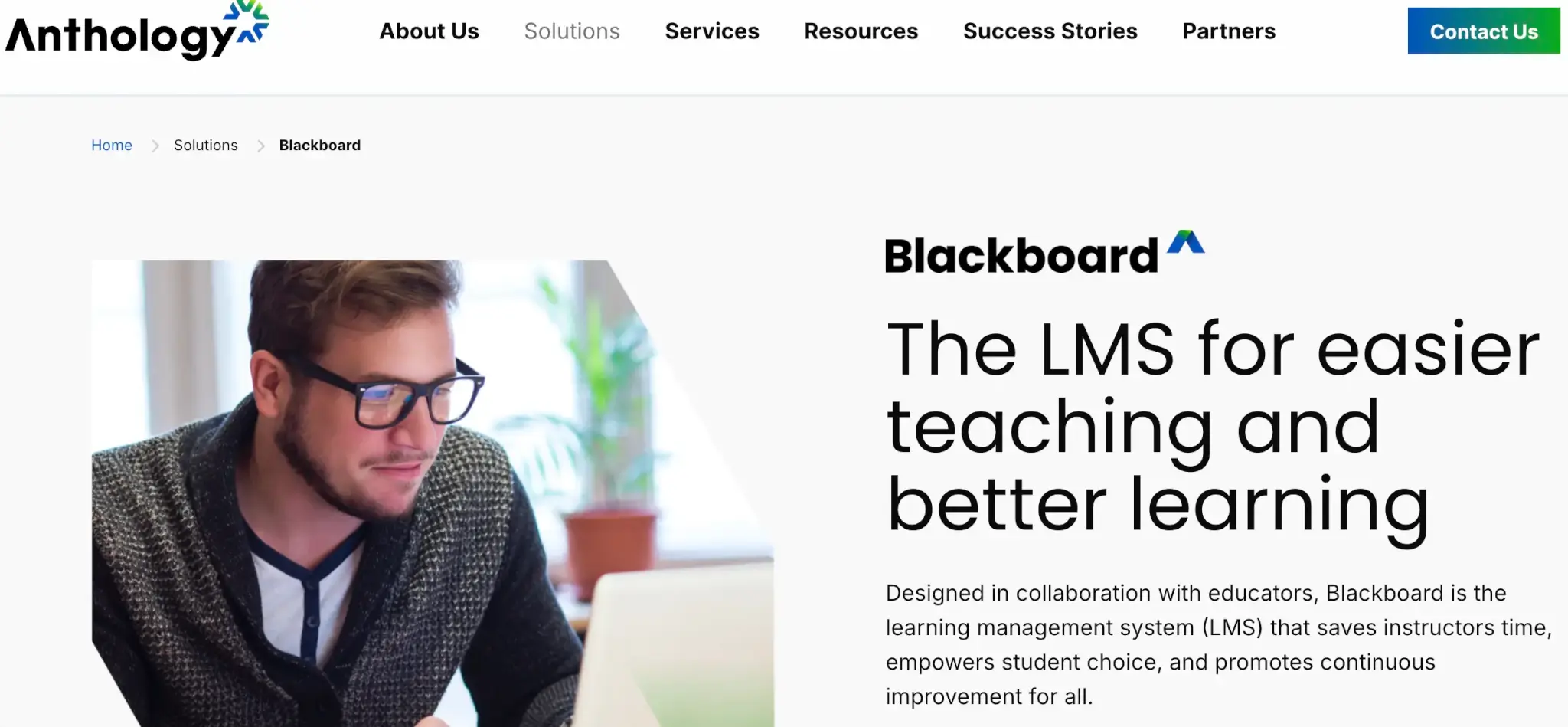





Blackboard Learn, a versatile LMS and one of the longest-standing providers of online learning for both educational institutions and businesses, is one of the top Canvas LMS alternatives. The platform offers multiple online collaboration features, forums, virtual classrooms, AI Design Assistant for course creation, and rich assessments.
It also integrates with accessibility tools to ensure you create an inclusive learning environment. Although content management is easy, some reviews mention the platform’s design is outdated, and some admin tasks require too many steps to be completed.
Pros & Cons
Pros
- User-friendly
- Promotes social learning
- AI-powered
- Robust assessment engine
Cons
- Limited reporting
- Outdated design
- Occasional technical glitches
- Inconsistent mobile app performance
Pricing
Blackboard Learn offers a 30-day free trial. Pricing is available upon request.
💁See the top Blackboard alternatives in our comprehensive review article.
4. TalentLMS
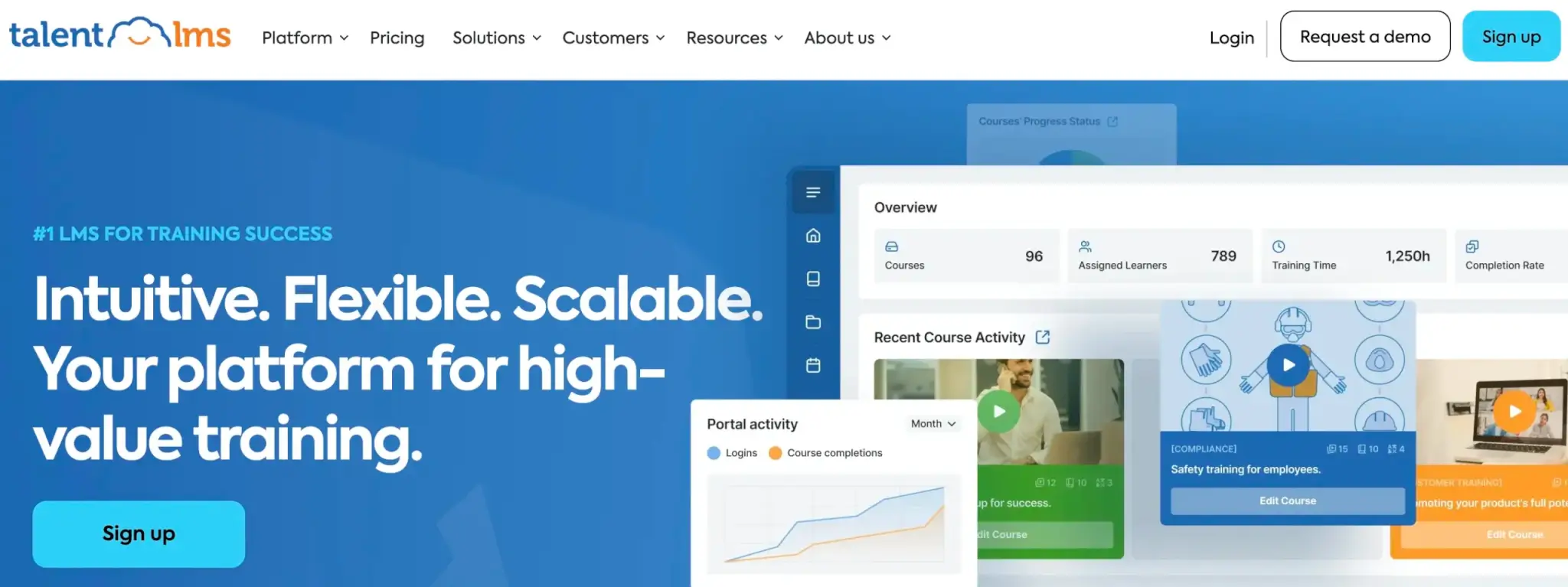





TalentLMS is a versatile LMS with a user-friendly interface, built-in content authoring, an AI assistant, and TalentLibrary, a regularly updated content repository with animated characters. The platform features gamification elements to enhance engagement, although its community feature is rather limited.
TalentLMS allows for customizable learning paths and rich assessments and provides comprehensive insights with customizable reports. Other features include user roles and permissions, automated tasks like course management and email communications, compliance management, and a white-label mobile app.
Pros & Cons
Pros
- AI-powered
- Content library
- Advanced gamification
- Robust reporting
Cons
- Limited assessments
- Outdated UI
- User limits per plan
- Technical issues setting up integrations
Pricing
TalentLMS offers a limited free plan that allows for up to 10 courses and 5 users. Paid plans start from $139 per month.
* Pricing information retrieved from TalentLMS on February 18, 2025.
5. Moodle
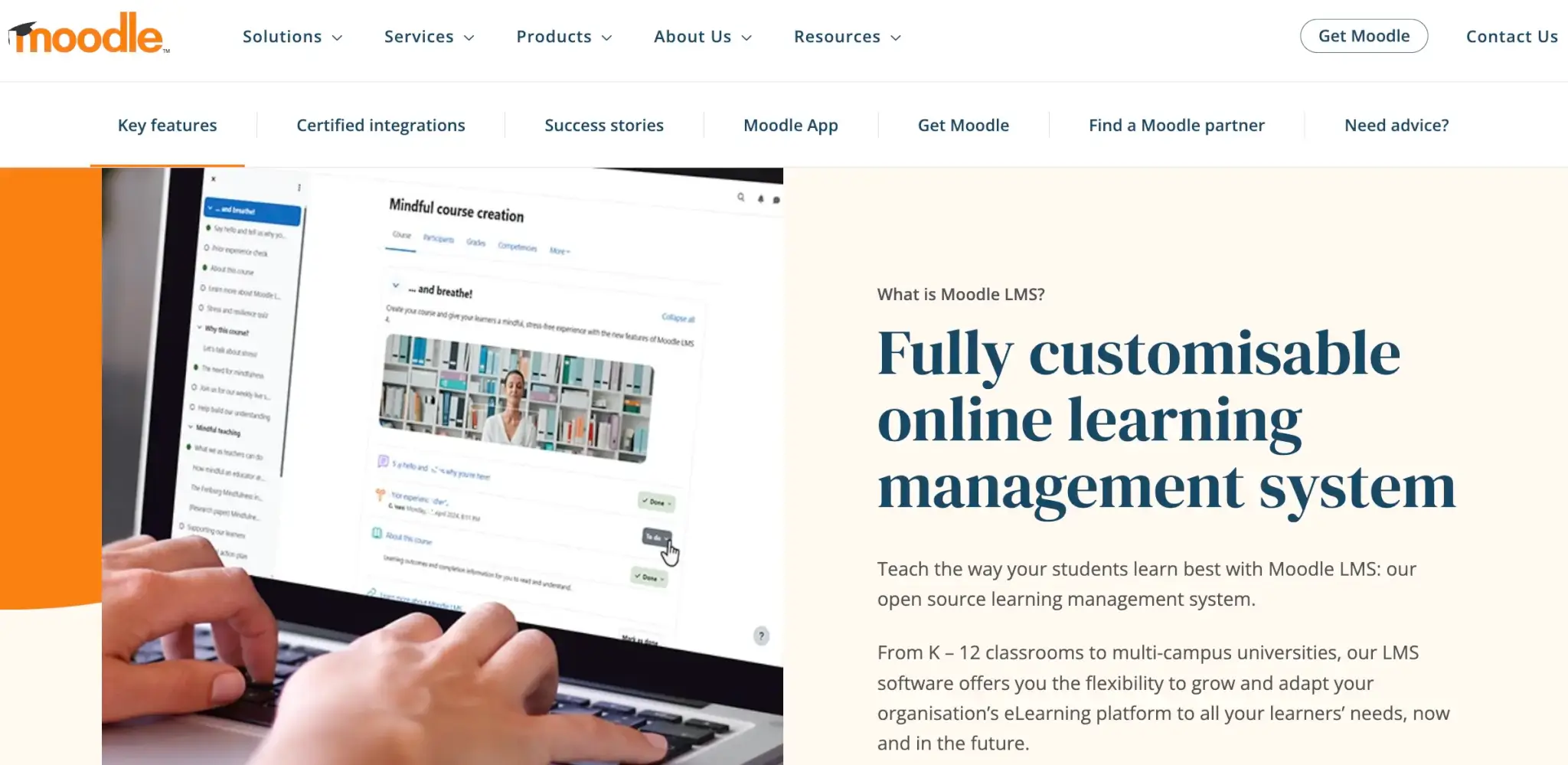





Moodle LMS is among the top Canvas LMS alternatives as it’s a flexible SaaS LMS with multiple built-in add-ons, ideal for educational institutions and corporate training. It additionally offers integrations with both open-source and premium third-party tools to enhance its functionality. Furthermore, Moodle seamlessly integrates with libraries of ready-made learning programs.
Moodle allows you to create multiple fully branded environments and offers robust user management, task automations, and permission controls. Advanced reporting capabilities and intuitive meeting scheduling are also available. Moodle is focused on effective learning experiences, offering a wide range of assessments, gradebook management, badges, and diplomas.
Pros & Cons
Pros
- Highly customizable
- Multiple automations available
- Advanced security features
- Content library
Cons
- Outdated & complex UI
- Learning curve
- No AI course creation
- Slow loading times & glitches
Pricing
Moodle offers a free trial and one pricing edition that starts from $200.
* Pricing information retrieved from G2 on February 18, 2025.
6. D2L Brightspace
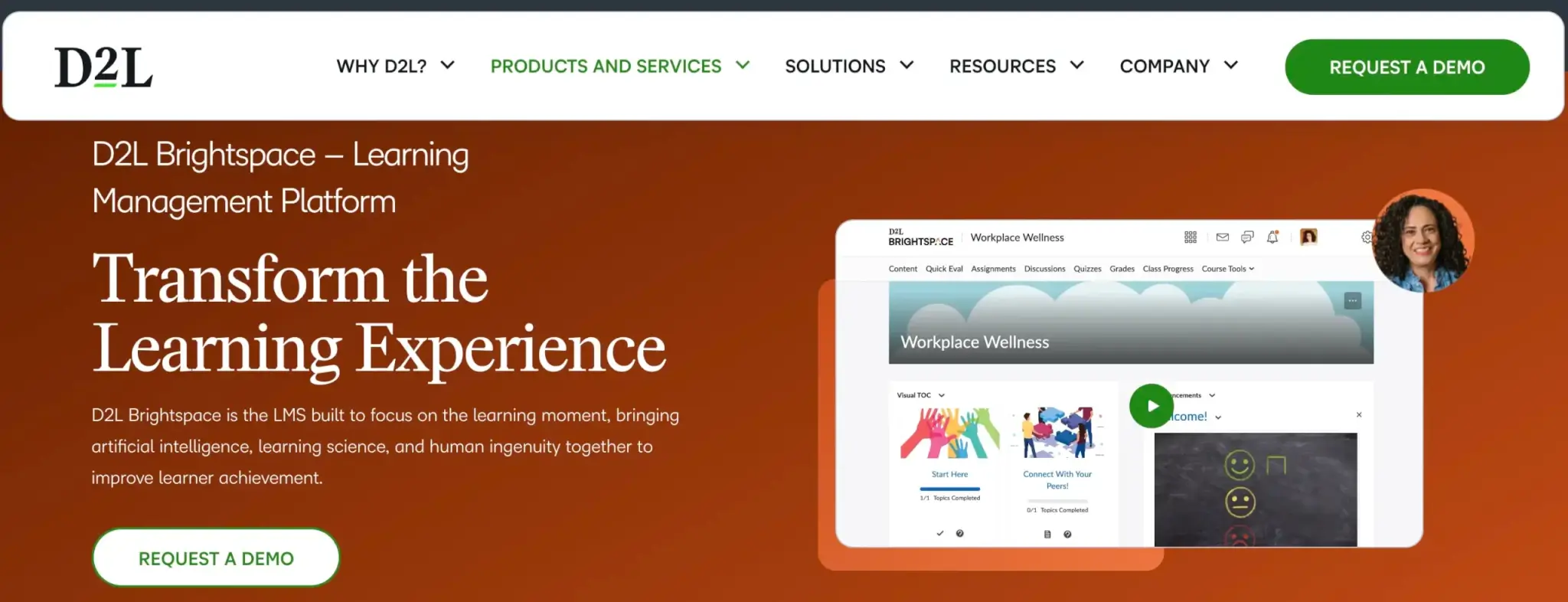





D2L Brightspace boasts an intuitive UI and an easy-to-use AI-powered content editor. It allows for personalized custom learning paths and complies with accessibility standards for inclusive experiences. It features several integrations to facilitate data flow among your systems.
It also offers custom reports and dashboards, ready-made courses, gamification elements and certificates, as well as access to in-house experts for skills mapping and course creation.
Pros & Cons
Pros
- Intuitive content management
- Rich learning features
- Highly customizable
- Pleasant UI
Cons
- Lacks detailed support documentation
- Initial learning curve
- Cumbersome configuration
- Navigation for admins can be tricky
Pricing
Available upon request.
7. LearnDash
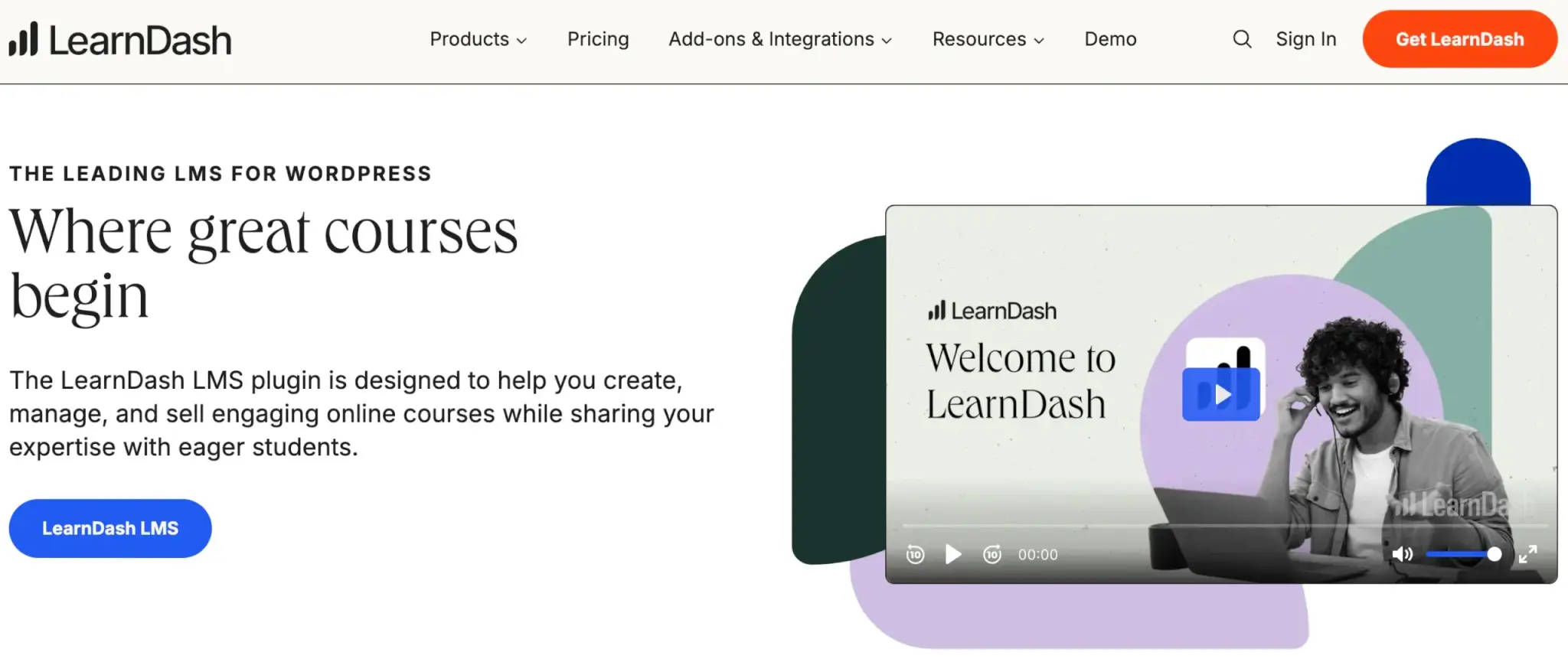





LearnDash is a WordPress LMS plugin that enables you to connect your online academy to your existing website. It offers rich educational features to support online learning, like drip-fed content, learner assessments and knowledge checkpoints after each session, certificates and badges, and progress bars. Its Focus Mode feature allows for a distraction-free learning environment.
LearnDash additionally integrates with multiple add-ons to supercharge its original functionality. A couple of notable disadvantages, however, are the hidden costs that come with add-ons and the fact that it requires some level of tech knowledge to install and maintain.
Pros & Cons
Pros
- Rich learning features
- Highly customizable
- Intuitive course builder
- Focus mode
Cons
- Needs technical knowledge
- Hidden costs due to add-ons (eg, SCORM)
- Limited design customization
- Lacks robust reporting
Pricing
LearnDash starts from $199 per year for one site license.
* Pricing information retrieved from LearnDash on February 18, 2025.
💁See the best LearnDash alternatives in our review article.
8. Docebo
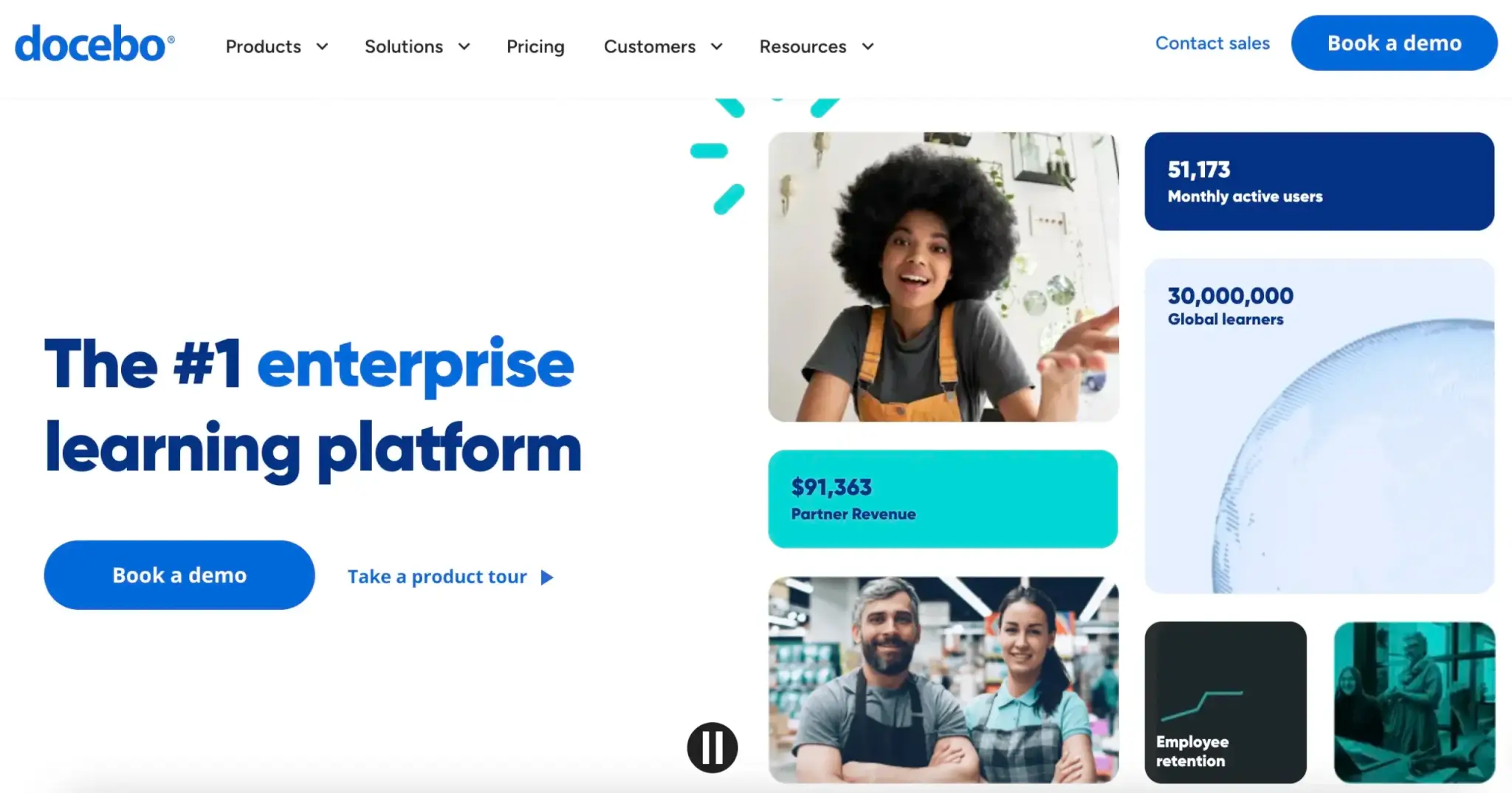





Docebo is an enterprise-grade LMS with advanced features that streamline training programs and compliance management, offering personalized learning through AI-powered recommendations. It’s a scalable, cloud-based solution with robust course creation and collaborative learning tools, social learning features, and deep integrations with third-party apps like Salesforce, Slack, and Microsoft Teams.
Docebo Learn is the core LMS, while Docebo Shape enables content curation using AI. The platform also supports e-commerce, allowing organizations to sell courses, and white-label mobile apps.
Pros & Cons
Pros
- AI-powered learning recommendations
- Highly scalable
- Social learning & collaboration
- E-commerce features
Cons
- Expensive for small businesses
- Steep learning curve
- Limited course customization
- Slow customer support
Pricing
Available upon request.
9. Schoology Learning






Schoology Learning (formerly known as Schoology) is a K-12-focused learning management system. With a focus on meeting the needs of educational institutions, it supports blended learning, remote education, and in-classroom experiences. It offers an intuitive, social media-like interface that facilitates collaborative learning and communication among students, teachers, and parents.
The platform includes built-in assessment tools to evaluate learner progress, grading features, discussion forums, and Google/Microsoft integrations. It is widely used by school districts for managing curriculum and lesson plans.
Pros & Cons
Pros
- User-friendly interface
- Google & Microsoft integrations
- Robust grading & assessment tools
- Collaboration tools for students
Cons
- Limited customization
- Mobile app has glitches
- Some admin settings are tricky
- Limited reporting options
Pricing
Available upon request.
10. Google Classroom






Another tool commonly listed among canvas lms alternatives, Google Classroom is a free, lightweight LMS designed for schools and educators using Google Workspace for Education. It provides basic course management features, including assignment creation, grading, and feedback tools.
The platform seamlessly integrates with Google Drive, Docs, Sheets, and Meet, making it ideal for schools already using Google’s ecosystem. While Google Classroom is not a full-fledged LMS, it offers essential features for online learning and serves as a simple, easy-to-use solution for managing digital learning.
Pros & Cons
Pros
- Free to use
- Easy to set up
- Integrates with Google Workspace
- Mobile-friendly
Cons
- Lacks advanced features
- No built-in reporting & analytics
- No automations
- Limited customization
Pricing
Available upon request.
11. Open EdX
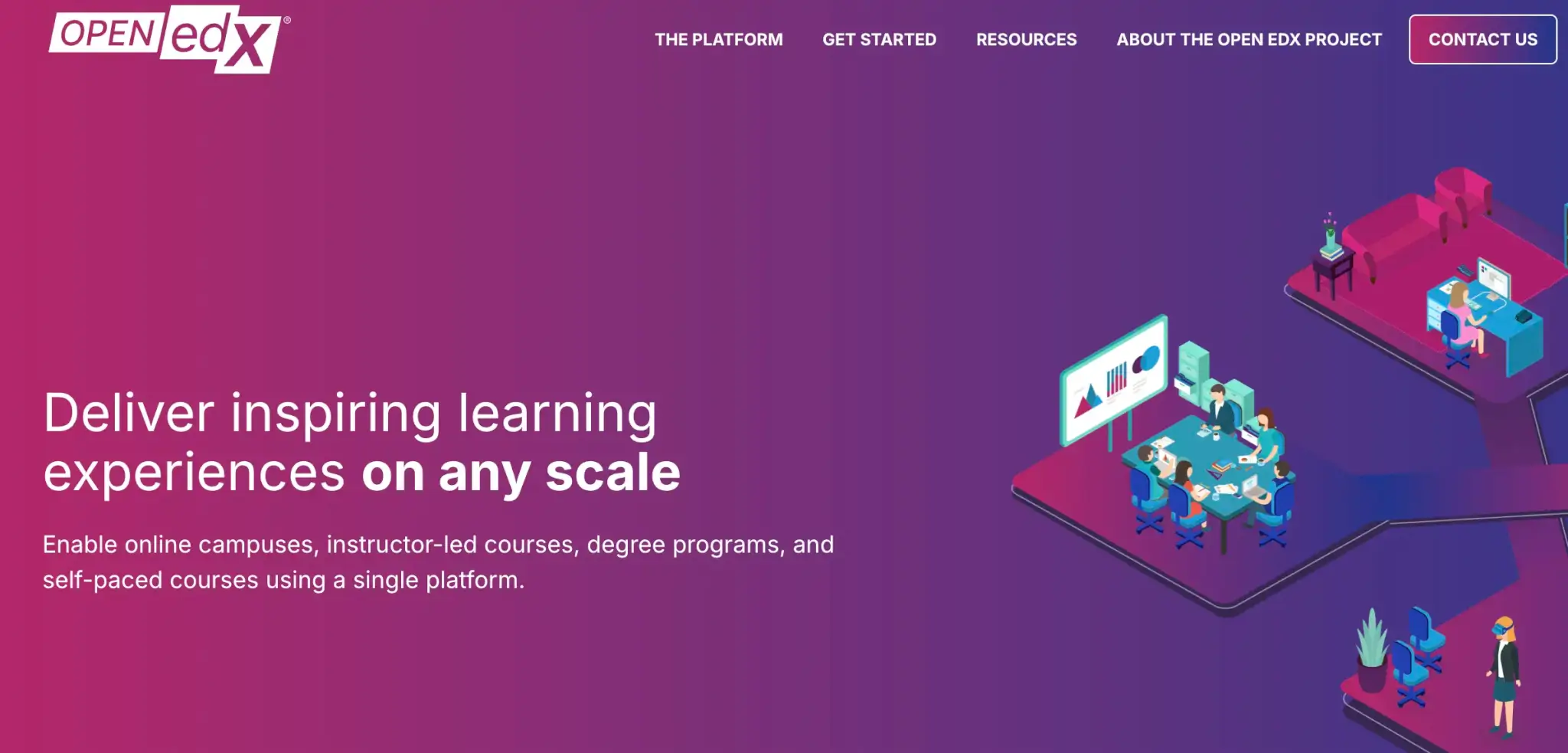





Open EdX is an open-source learning management system with rich learning features and multiple integrations. The platform supports several types of content and is SCORM-compliant. It features course forums to promote collaboration but offers no further opportunities for interaction.
Overall, Open EdX is much easier for front users than admins. It requires some level of tech-savviness to set up, which makes it less intuitive than other options on this list. However, it features extensive documentation and a supportive community to find solutions to technical issues that may arise. Users also mention that the platform is reliable, stable, and secure.
Pros & Cons
Pros
- Free
- Modern User Interface
- Highly customizable
- Supports LTI
Cons
- Requires coding knowledge
- Hard to set up and configure
- Limited interactive activities
- Community-based support only
Pricing
Open EdX is free to use when self-hosted.
What are the key differences between Canvas LMS and its alternatives?
Let’s see briefly how the online learning platforms we have reviewed compare to Canvas LMS in terms of key functionalities and characteristics.
Comparing LMS software at the moment? As you’re looking for canvas LMS alternatives, download our free RFP template to better organize your search. This template has everything you need to ask vendors to find the perfect fit.
Choosing a learning management system is not easy. We have explored the top canvas LMS alternatives and key competitors. Call us prejudiced, but an option that stands out is LearnWorlds. At an affordable price and with rich features that support every elearning need from course selling to corporate education, LearnWorlds is an LMS that doesn’t disappoint. Join 10,000 happy customers today with a 30-day free trial.

Androniki Koumadoraki
Androniki is a Content Writer at LearnWorlds sharing Instructional Design and marketing tips. With solid experience in B2B writing and technical translation, she is passionate about learning and spreading knowledge. She is also an aspiring yogi, a book nerd, and a talented transponster.
FAQ
Everything you have ever wondered, but where too afraid to ask...


